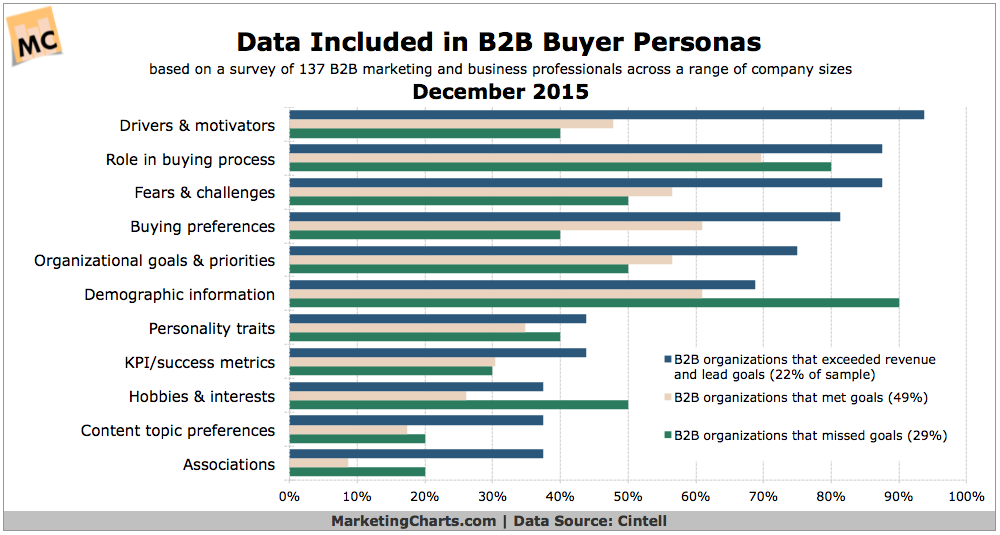The marketing persona is a tried-and-true customer segmentation strategy that many companies rely on to get the big picture about the people they serve. At the same time, these marketers and their teams are gathering copious amounts of data from and about those customers.
Because there is so much data out there, it can be difficult to tie all that information to specific segments. But that doesn’t mean it has to go to waste. In fact, with the data you’re collecting right now, you can make some pretty impressive leaps in better understanding and serving your customers. Here’s how to do it.
Overview: What is Qualitative Research and Why Does It Matter?
Oftentimes, marketers will use terms like “qualitative research” and “quantitative research” to mean the same thing, when they are quite different.
Qualitative research, as we’ll discuss here, is understanding the motivation behind something, its underlying reasons, opinions and so forth. From a marketing point of view, it asks why customers behave or react a certain way. A video of a user testing session or a focus group are examples of qualitative research.
Quantitative research, on the other hand, looks at the numbers to quantify opinions, attitudes and so on to create results from a larger sample size. These methods include surveys, polls and telephone interviews. It is designed to uncover things like shifts in perspective or to detect certain user patterns. Many times marketers will use both to better create fuller, multi-dimensional user personas – however, it’s the qualitative research that provides for the most insight in this case. The quantitative research simply backs up your findings.
To remember which is which, it may be helpful to keep in mind that quantitive is quantity. Quantity is numbers, and therefore quantitive research deals with numbers.

A study last year from Cintell shows that understanding drivers and motivators from customers is on the priority list of B2B companies
Uncovering New Customer Personas

By analyzing the qualitative data you’re gathering, you’ll start to see what motivates your customer to take action. But what if you can’t tie that motivation to any existing persona? The solution is to then create a new one! These days there are now more tools than ever available to help you discover customer intent and monitor customer behavior. You can tap into the “person behind the metrics” to add new facets to your existing personas – the kinds of deep, granular detail that haven’t been possible until now.
As your customer persona comes into better focus, you may even find some outlying information that just doesn’t add up. That’s where potentially creating a new persona, or an offshoot of an existing one, can help. New personas and segments represent a major positioning strategy that can give you that all-important “first mover” advantage with an untapped or under-served market.
Going Beyond the Numbers

Another area where qualitative research shines with regard to marketing personas is getting at the underlying core of what makes that person tick. Humans are a fickle, ever-changing bunch, and it can be hard to pin down behavior of why they might abandon a cart one day and then seamlessly ride through checkout the next.
Marketers may look at the numbers to see that a great deal of people are stopping right before checkout and leaving without placing an order. The numbers tell us that much – but they don’t tell us why.
Taking a more qualitative approach, such as videoing a prospect going through the process and recording their thoughts as they proceed provide accurate, clear and actionable reasons why they made the choices they did. There’s no guesswork, no fruitless searching for reasons why. It’s all out there in the open, ready to be acted upon.
This kind of live recording also captures many things that typical analytics cannot, such as eye tracking, facial movements and reactions, so you can see precisely the effect that your call to action is having on prospects. What are they focusing on? What are they ignoring? What are they struggling with and what questions do they have? These are all questions that can be answered in great detail by analyzing the qualitative information you’ve gathered.
Putting the “Person” Back in Persona

Finally, you could look at qualitative research as the type of study that puts the person back in persona. Analytical numbers are great for determining technical mishaps, uncovering the best ROI channels and other areas where core numbers make a difference. But with marketing personas, much of what has already been created is based on what little personal information can be gleaned from those numbers. I’m talking about things like gender, location, referrer, device and so on.
These details are great for building the “skeleton” of a persona – but they do nothing to dive into the motivations behind their actions. And despite our capricious urges as online shoppers, many of the things we do are predictable and can be measured. We typically ditch sites that ask for too much information from their forms, or require us to create an account first. We take a considerable amount of time to read reviews and comparison shop on larger purchases, and we often look for recommendations from those we trust before we decide. It’s not just human nature, it’s smart business.
Qualitative research puts these kinds of actions back into the marketing puzzle. Imagine showing a focus group your new product and gauging their reaction to how you’ve chosen to brand it. What are they focusing on, and is it the same thing that you thought would appeal to them? So much of what can be built out of a persona based on numbers alone is pure guesswork – but being able to see their reactions, their focus and their feedback firsthand provides the kind of insights you can’t get from charts and graphs.
Now It’s Your Turn…
Are you using qualitative research in your own marketing analyses? Have you uncovered any new persona segments or discovered something completely new about your target audience as a result? Share your thoughts with us in the comments below!
About the Author: Sherice Jacob helps business owners improve website design and increase conversion rates through compelling copywriting, user-friendly design and smart analytics analysis. Learn more at iElectrify.com and download your free web copy tune-up and conversion checklist today!